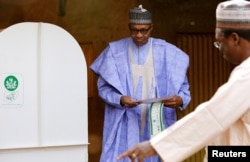Vote-counting began Saturday in Nigeria's hotly-contested presidential election that was marred by violent outbreaks in the northeastern and southern parts of the oil-rich nation.
President Muhammadu Buhari was among the first of the country’s more than 72 million eligible voters to cast a ballot in his hometown of Daura when the polls opened Saturday for the country's delayed election.
Just hours before voting began, explosions were heard in the northeastern Nigerian city of Maiduguri, the capital of the Borno State. After initially denying an attack, Nigerian security forces confirmed that Boko Haram insurgents tried to infiltrate the capital by launching artillery fire.
Borno State police added that “some missiles strayed into vulnerable locations,” but no one was killed and the insurgents retreated. Other security sources said one soldier was killed and four others wounded.
In the northeastern town of Geidam, a military outpost was attacked before voting started. Military spokesman Colonel Musa Sagir said there were no casualties and people in the area were allowed to vote after calm was restored.
Despite these and other reports of occasional violence, there appeared to be no significant disruptions across the West African country. Some polling stations, however, opened so late in the day that voting in affected areas may be extended to Sunday. Voting hours were also extended in some areas Saturday due to ballot machine malfunctions.
Preliminary results are expected by early next week, elections observers said.
Buhari and his primary opponent, businessman Atiku Abubakar, both said as they cast ballots in an election that was delayed one week, they were confident of victory.
In a nationally televised address Friday, Buhari said security had been mobilized across the country for the polls, and pledged that people will be able to vote without intimidation or fear.
Political tensions were high as Nigerians prepared to elect a new president and parliament. During the campaign, Buhari's All Progressives Congress and the main opposition Peoples Democratic Party accused each other of attempting to fix the outcome.
Earlier this week, Buhari urged the military to be "ruthless" with anyone who tries to interfere in the voting process.
The remark drew sharp criticism from Abubakar, who said the military has "no role to play" in the elections.
Nigeria's elections were initially planned for last Saturday but the electoral commission, citing logistical issues, abruptly postponed them just five hours before polling stations were set to open.
The commission said Friday it was ready to deliver free and fair elections. The chief spokesman to the commission chairman, Rotimi Oyekanmi, said officials resolved most of the problems that led to the postponement of the February 16 election.
Some 84 million Nigerians are registered to vote, but more than 72 million had received voting cards before the election began. The presidential contest is widely seen as a tight race between President Buhari and Abubakar, a former vice president.
After ruling briefly as a military dictator in the 1980s, Buhari won the 2015 election, becoming the first opposition candidate to defeat a sitting president.
VOA’s Peter Clottey contributed to this story from Abuja and VOA’s James Butty contributed from Washington.







